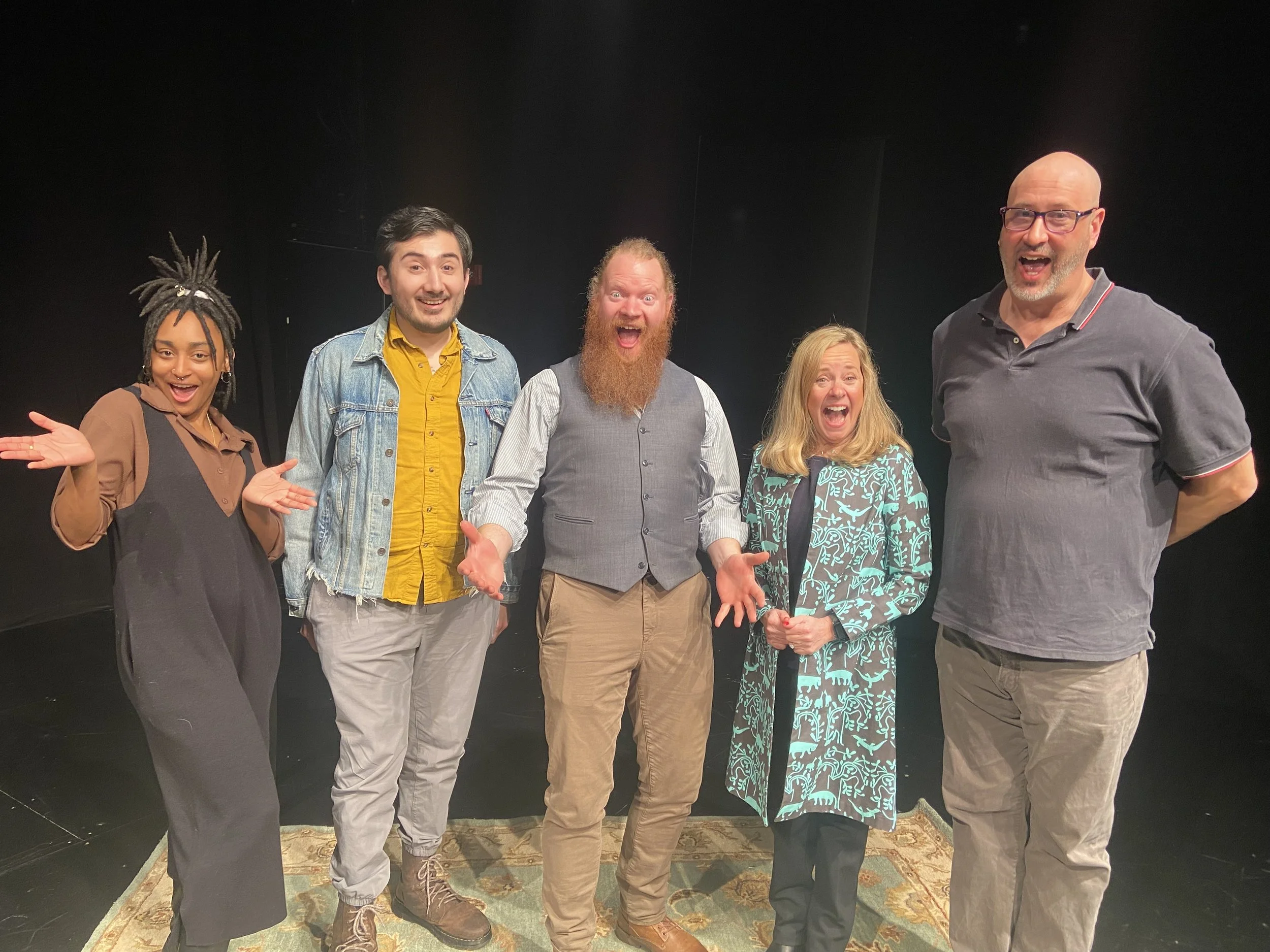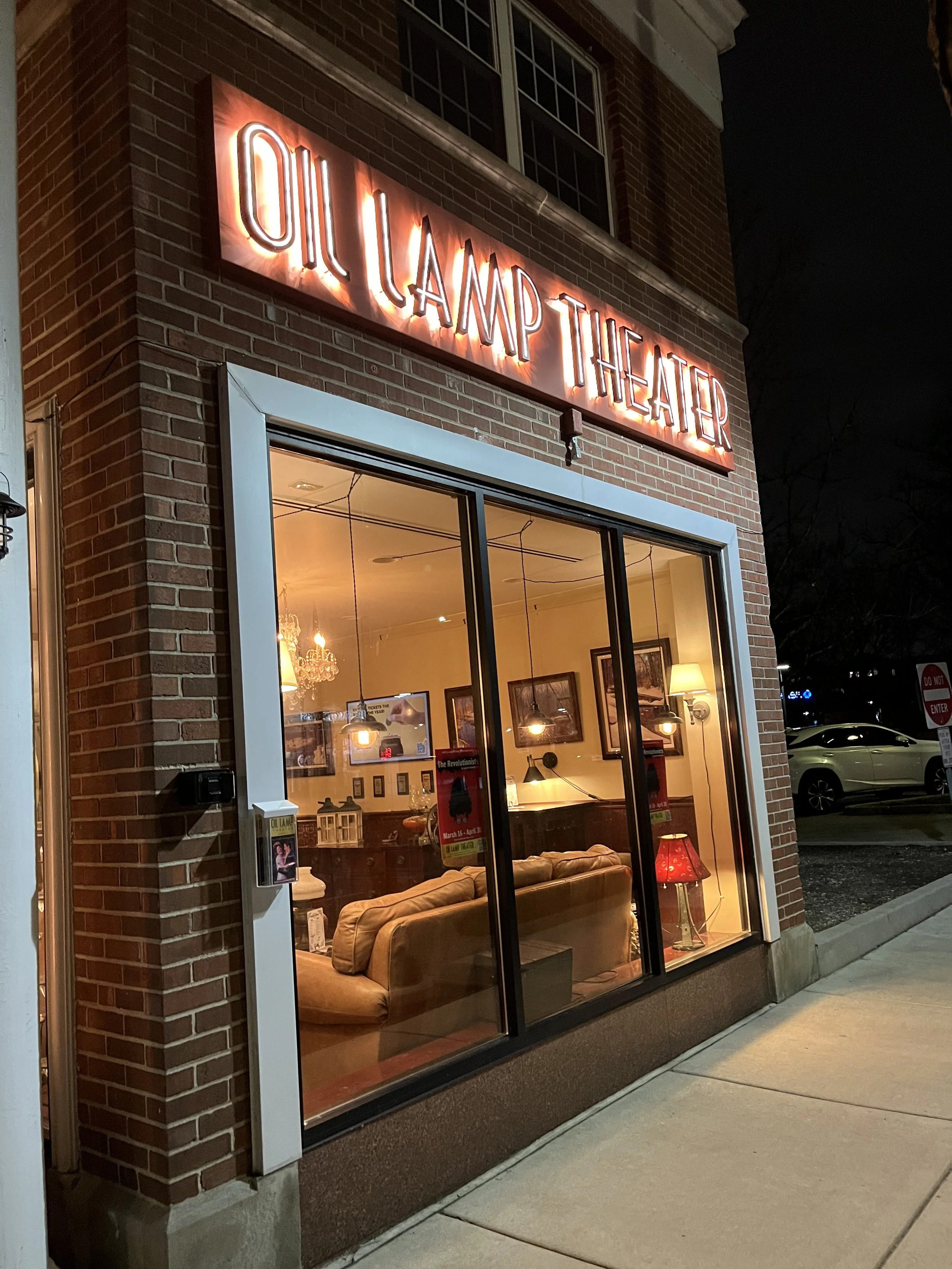Award-Winning Storyteller & Public Speaker
Hi. My name is Christine Wolf.
I inspire people to find and share their authentic voices
by speaking about the tough subjects we tend to whisper about.
I focus on overcoming adversity, grief, and mental health as they all relate to
resilience and approachable leadership.
Holy Cow! I Won A Moth StorySLAM!
I was thrilled to be named The Moth’s StorySLAM Champion on June 20, 2022 at SPACE in Evanston, Illinois. The theme of the evening was “Birthdays”. Copyright @ The Moth, 2022. Any illegal reproduction of this content will result in immediate legal action.
Christine Wolf, Moth StorySLAM Champion, Evanston, Illinois, June 20, 2022. Theme: “Birthdays” (Photo: Eric Ronne)
Storytelling at Writers’ Theater, March 9, 2023, with (from left) the incredible Khloe Janel, Juan Muñoz, Steve Peebles, and Scott Woldman. Photo courtesy of Writers’ Theater.
Where to Catch Me Next
March 23, 2024
Chicago GrandSLAM Championship @The Moth
Athenaeum Theater
2936 N Southport Ave, Chicago
Each ticket purchase includes a copy of The Moth’s new book, A Point of Beauty: True Stories of Holding On and Letting Go, coming out on March 19, 2024! The Moth’s fourth anthology is an inspiring and entertaining collection of unforgettable true stories about finding unexpected beauty in life’s transitions. Storytellers in A Point of Beauty include Elizabeth Gilbert and Quiara Alegría Hudes alongside tales of an international rescue mission for Paddington Bear, a family matriarch running numbers in Detroit, an epic Lucha libre showdown in Mexico City, and more. The book will be distributed to ticket holders the night of the GrandSLAM.
March 16, 2023
Short Story Theater
Highland Park, IL
Photo by Donna Lubow
March 9, 2023
Writers’ Theater
Glencoe, IL
March 3, 2023
Speakeasy Nights at The Oil Lamp Theater
Glenview, IL
During my first time on The Moth stage, I was nervous…I rambled…I cried…and I went WAY over the 5-minute time limit.
And, I was totally hooked:
During my first appearance on The Moth stage, on February 19, 2018 at SPACE in Evanston, Illinois, the theme of the night was “Transit”. I spoke about the fatal train accident I survived in 1993, and the critical need to keep going despite hardship and adversity. Copyright @ The Moth, 2018. Any illegal reproduction of this content will result in immediate legal action.
Reach out to book me for your next keynote, panel discussion, or small group.
I also offer one-on-one presentation skills coaching.
I regularly speak about topics like resilience, adversity, grief, mental health, and approachable leadership.
I’m happy to tailor an authentic presentation to your needs,
or to help you design an impactful presentation of your own.
How I Became a Storyteller
It all started when my grandmother’s eyes glistened as I told her stories from my life as a first-year high school student.
“Nana?” I’d ask. “You okay?” She’d be smiling, but there were often tears on her cheeks.
“I love how you tell it like it is,” Nana said. “Promise me you won’t ever change.”
I’d think to myself Of course I won’t! Duh.
In those days, Nana lived alone and struggled with health issues, but she never wanted to talk about them. Instead, from the moment I walked in her apartment door, she’d ask about my world.
“Tell me all the news!” she’d say, with her elbow on the table and her chin in her hand. “I couldn’t wait until you got here!”
I loved how rapt she seemed to hear the stories of my life, and I loved the reaction I got when I simply spoke my mind. Whether I talked about a class assignment or an issue with a sibling or a note I’d received from a friend, Nana listened as if there’d be a test on the details later, wide-eyed and nodding her head to let me know she heard me.
And, when I shared my opinion on something, she always shook her head and replied enthusiastically with things like “You can say that again!” or “Oh Chrissy! You’re just so earthy!”
“What’s ‘earthy’?” I once asked.
“Earthy? Oh, Dolly. Earthy means you’re being real.”
Of course I am, I’d think, wondering what the alternative was. As a 15-year-old, I hadn’t yet felt the impact of a society that thrives on shaping people through tactics like shame and control.
“I’m just being me,” I said, shrugging my shoulders.
“Stay that way,” Nana said. “It’s your best feature.”
At that time, my existence felt hardly compelling. Why would anyone but my grandmother find a 15-year-old’s life interesting? My days revolved around teachers, classmates, co-workers, parents, and siblings. What was so exciting about my studying for a driver’s license or dreaming of romantic dates with pop stars? What was so fascinating about my tales of friends, grades, struggles, and dreams?
I came to see that Nana was less interested in my “reporting” and more captivated by my observations. While it’s true that hearing about my everyday life was her escape from a lonely life, she was most moved by my views on navigating the journey.
When I’d ponder a dilemma and look into Nana’s eyes in silence, she wouldn’t try to fix things. She’d just look back at me with love, as if to say, I hear you. I see you. I trust that you’ll figure this out.
Soon enough, though, life taught me some very hard lessons, and nearly all of them involved secrets that others asked me to hold:
• “Don’t talk about your alcoholic father and his problems.”
• “Don’t be dramatic and focus on the abuse you suffered. Just move on.”
• “Don’t tell people you suffer from anxiety or depression.”
• “Don’t broadcast the fact you’re seeing a therapist.”
• “Don’t let others know when you’re struggling.”
• “Don’t tell anyone that [X] got pregnant and got an abortion.”
• “Don’t tell anyone that [X] attempted suicide.”
• “Don’t tell anyone that [X] cheated on his partner.”
By the time I received my college diploma, I was managing as many secrets as truths. During my early 20s, instead of working hard to keep things together and maintain a façade of a put-together gal, I’d long for those unedited days when I’d sit with Nana and tell her everything about my life.
I never expected to feel as insecure as I did in my twenties, and when I finally shared those feelings with Nana, describing the interactions I had with my peers, my co-workers, or my husband, she seemed to understand.
“Remember what I said?” she’d say. “About staying true to yourself? You’re being tested now.” This was her loving way of saying, Didn’t I warn you?
I’d open my heart and tell her what I was going through, and in doing so, I felt an immediate sense of connection, compassion, and comfort. I also got those feelings OUT and into the light where they always felt less ominous and overwhelming.
********
When Nana died after a series of strokes in 1996, I was 28 years old.
As I collected my thoughts to share my memories of her life at her funeral, I considered that this might as well be the last time I ever told a story. Who else but Nana would appreciate my “earthy” delivery…my “humorous take on life’s worst moments”…or my “ability to cut to the point and say it like it was?”
My life would only continue to harbor secrets, right? So, why should I bother opening up and risking saying the wrong thing? It’ll be easier, I reasoned, just to keep my mouth shut.
I maintained this attitude for the next two decades, working in jobs I didn’t love and tolerating relationships that left me feeling empty. To be sure, there were many, MANY happy times, too — and I focused as much as possible on those.
When toxic positivity steps into the picture, it takes over and tips the emotional scales. I’ve come to see that toxic positivity is a lot like ivy. On the outside, it looks glorious and lush and healthy…but it takes over the environment and chokes out anything else in its ecosystem. During my 20s and 30s, though I had a voice, it rarely express my deepest, most honest thoughts.
Nana had been right all along. I’d lost myself. I’d lost my authentic voice.
I finally reached the point in my 40s when I couldn’t keep things “in” anymore. Secrets (and resentment) began to leak out sideways. I found myself less able to hold the boundaries others had imposed. I fantasized about stepping up to the metaphorical mic and speaking my truth. And then, I stopped dreaming. I decided to take action.
It began when I decided at 39 to become a professional writer. I didn’t know what I was doing or how to make it happen, but I knew I’d rot inside if I didn’t let my feelings out, and writing seemed like a safe and measured way to accomplish this. I didn’t have a degree in writing or journalism, but I’d always loved to write. Was that enough? I was about to find out.
I started blogging…and that led to weekly opinion columns, first with Patch, followed by the Chicago Sun-Times and The Chicago Tribune. During that time, I wrote a novel and performed my writing live on stages throughout Chicago. For 10 years, as I built a small and loyal audience, my subject matter never varied: I spoke from the heart about my observations on life, many of which touched on the struggles we often face. What always drove me was a desire to connect in a way I did with my grandmother: honestly, authentically, and without fear of judgment.
Still, I got a good dose of judgment thrown at me, especially when I shared truths that made some people uncomfortable.
Take, for example, the time I wrote about being sexually assaulted in high school. While many readers thanked me for acknowledging a type of traumatic experience that had also happened to them, a few (men) suggested I’d brought on the attack myself, or that I could have handled things (as an 18-year-old girl) much better.
Another time, when I shared the details of a train accident I’d survived, someone accused me of being attention-seeking.
And, when I shared details of how I’d launched my freelance business, some readers criticized the opportunities I’d had that they had not.
Initially, each one of these judgments stung and made me stop and think. After all, what’s the point of ANY feedback if it’s all glowing and positive (see Toxic Positivity reference earlier)?
But from those negative comments, I gained 4 important things:
1. Humility
2. Perspective
3. A thicker skin
4. The realization that some people are just wired to take us down. And it’s THIS POINT that helped me understand what my Nana had warned me about. THIS is how society silences us — when we lose ourselves to others’ beliefs and judgments.
The fact is, no one knows your truth better than you.
And, while your circumstances might make others uncomfortable, you aren’t responsible for managing their discomfort. While you don’t have to be an asshole about it, you aren’t obligated to manage others’ inabilities to cope with your reality, be it a mental health struggle, a history of trauma, or a belief that doesn’t align with theirs, and so on.
Overall, the response to my writing has been life-changing. When I hear from readers who thank me for putting words to thoughts and feelings they’ve also had but didn’t know how to express, I know I’m living a life with purpose.
One reader recently responded to my piece about grieving the loss of an estranged parent:
"I found this wonderfully authentic and honest post and it helped. What I’m feeling is powerful, I just needed a vocabulary to name it. And in a way, it’s healing, more than years of therapy. I lifted myself out of generational patterns, but I mourn the loss of what could have been. Thank you for providing some peace and solace to another abandoned child.”
I credit my grandmother for instilling in me a sense that every life story can be important and interesting, and I bring this approach to the memoir clients I coach. If and when anyone asks (as they often do), “Will anyone find my story worthwhile?” or “Will anyone even read this?”, my answer is always and honestly, “Yes. They absolutely will.”
It took ONE person to help me see that my life stories were worthwhile.
And now, in addition to writing my stories, I’m grateful to share them in real life during keynote presentations, panel discussions, and small group settings. When I do, no matter how big or small the audience is, it’s like sitting across from Nana in her little apartment, connecting deeply and authentically.
I hope she’s looking down upon me these days with that same sparkle in her eyes. I hope she knows that she inspired my confidence as a writer and storyteller. And I hope she can see that I’m trying my best to do the same for others.
Reach out to book Christine Wolf for your next keynote, panel discussion, or small group. Christine regularly speaks about topics including resilience, adversity, grief, mental health, and approachable leadership.





